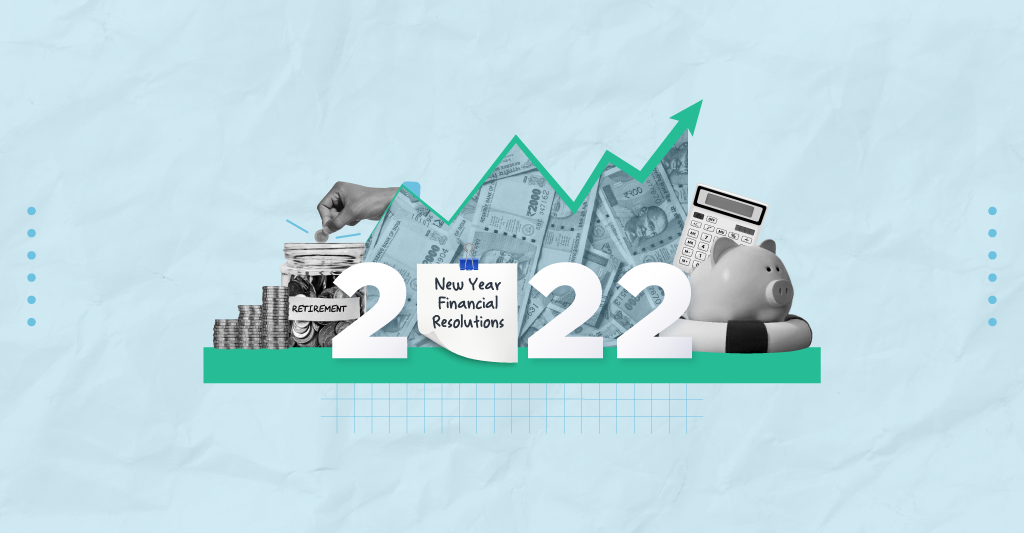Last Updated on May 24, 2022 by Anjali Chourasiya
New Year’s resolutions are a popular thing to make. Every new year starts with a clean slate, an empty room waiting to be filled with opportunities and hope. Moreover, the last two years have challenged us in more than one way. And indeed, with everything that has happened, one thing is certain: the importance of financial aid. A realisation that it has to be our priority, no matter what.
As easy as it is to write your resolutions, it is easier to break them. But having a goal can keep you on track and act as a constant reminder. So, if you wish to have a fresh financial start to the year 2022, you’re in the right place. We’ve got a few ideas to help contribute to your list of resolutions. Continue reading if you want to add some of these or all of these options to it.
Table of Contents
Create an emergency fund
There is always a tinge of uncertainty in all our lives. And for this, you need to have some money kept away as your emergency fund. This fund may be the only thing that saves you when an unexpected expense crops up or your income is reduced.
If you don’t have an emergency fund, it is better to start building from now. Ideally, you should have at least three to six months of income put aside as your emergency fund.
Stick to a budget
Creating a budget and sticking to it may not excite you as much as other resolutions you have planned for 2022. But this definitely is a crucial step if you want to manage your finances better.
Without a budget, you may not know where all your money is going. And this, in turn, becomes a hindrance to achieving your other financial goals like saving for emergencies or clearing your debts. Many budgeting apps could help make this task easy.
Start investing
If you have already started investing, kudos! And you can skip this point. But if you haven’t, investing should definitely be one of the top three on your priority list of New Year’s resolutions. It may not be easy and immediate, but it sure is one of the best ways to build your wealth.
Explore different investing options in stocks and other asset classes that could give you profitable returns. You can do so on tickertape which offers filters to suit your search requirements, a tab to help you do your research, Stock Screener to assist you with picking the right ones and comparing them with their peers, and more!
Pay off debts
Debt is neither good nor bad. For some, it might become necessary for purposes like investing in a long-term asset like a home, and for some, it might not be. However, debt becomes an issue when it feels like a burden rather than a tool.
Having said that, you can keep it under control. For instance, If you have multiple debts, consider consolidating them into a single, low-cost loan. You can also activate the auto debit option for EMI payments. This will help you in keeping your debt load manageable.
Save for your retirement
Who does not want to be self-reliant even after retiring? Saving money for your retirement life will help you be self-reliant. But it requires you to create a long-term investment plan. The sooner you start, the more money you will accumulate to keep your retirement life secured and financially protected.
There are multiple options to choose from to save for your retirement. A few viable ones are fixed deposits, provident funds, National Pension Scheme (NPS), mutual funds, and Atal Pension Yojana (APY). However, if you have more time for your retirement, you could always choose the equity asset class (which is often subdivided by market capitalisation into small-cap, mid-cap, and large-cap stocks) to build your corpus.

Rebalance your portfolio
As you all know, the stock market is often volatile and unpredictable. You never know when a few sectors overperform and a few underperform. There are chances where a particular sector that performed well this year may not produce the same results next year.
This is when rebalancing your portfolio plays an important role. It’s prudent to rebalance your portfolio and relook at the asset allocation. A few options for asset allocation are equities, real estate, gold, commodities, derivatives and mutual funds.
Please remember that asset allocation and diversification are two separate things. Diversification could also refer to different investment styles and not just asset classes. For instance, you could diversify your equity portfolio by investing in other sectors or companies based on their market capitalization.
Pay off your credit card
Having a nagging credit card balance can put anyone off. So, add clearing your credit card bills on time to your list of financial resolutions for 2022, as credit cards charge interest whenever you fail to pay the total balance. And the longer you push paying off the balance, the more interest you accrue.
Paying this debt should be on the top of your priority list because it saves you a lot of money in the long run. And an added advantage is it helps in improving your credit score! It’s advised to not purchase anything extra from the credit card that you haven’t paid the total balance. Plan accordingly and realistically how much you can clear off in a year.
Set savings goals that are achievable
Every one of us has a particular goal in mind when it comes to saving money. But at times, people don’t plan it well. Here’s why – there is a big difference between wanting to save Rs. 1.5 lakh and wanting to save Rs. 1.5 lakh in 6 mth.
The former is not actionable because there is no specific time period defined. However, the latter gives you a timeline, indicating that you must save Rs. 25,000 every month to meet your goal. When you think about it this way, it’s a lot easier to plan your savings.
Protect yourself with insurance
An illness, job loss, disability, death, natural disasters, or lawsuits – all these may throw your financial life into disarray. Make a resolution to get your insurance requirements covered if you don’t have enough assets to self-insure against significant risks.
Insurance helps safeguard against unanticipated situations that don’t happen very often but can be costly to manage independently. Choose a health insurance plan that suits your requirements, life insurance if you have people dependent on you, vehicle, and property insurance.
Practice a ‘no-spend’ day every week
This may come as a surprise, but this is also important if you want to have a healthy financial life. This could be one of the best ways to pause your expenditure, build on the savings and develop a positive attitude towards money. It helps you control your budget and help you stay confident and content when you have to manage your money.
If you don’t have any of your friends or family members practising this habit, be the first to start.
Conclusion
So, these were a few ideas we thought could help you make your financial new year’s resolution list. Like the saying goes – “hope for the best, but prepare for the worst” – you can set up a rainy day fund equal to at least six months of your pay to mitigate the damage. But remember, you are in no rush, so you don’t have to do it all at once. Take one step at a time by treating your resolutions as a checklist and ticking them one by one. We hope the year 2022 is filled with lots of hope, financial wellbeing, and good health. Happy New Year from us to you! #tickertapeHaiNa #DimaagLagana




